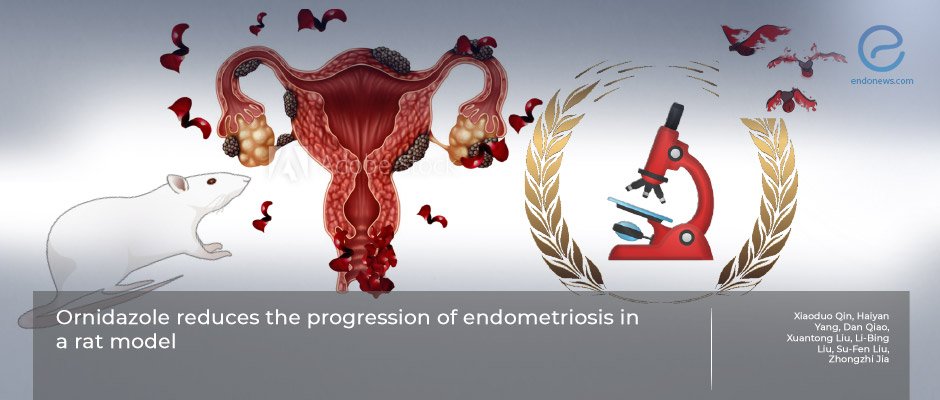Antimicrobial agent ornidazole yields promising effects in an animal model of endometriosis
Dec 5, 2022
Well known drug ornidazole could be potential endometriosis treatment candidate
Key Points
Highlights:
- Ornidazole is an antibiotic that has a strong anti-inflammatory effect with broad anti-microbial activity besides possessing some antiangiogenetic and anticancer properties.
- It is plausible that it may demonstrate some benefits in inhibiting the progression of endometriosis which depends on angiogenesis and inflammation.
Importance:
- Currently, there is not any effective nonhormonal drug in the treatment of endometriosis, in this context it is worth searching the effects of ornidazole.
What's done here:
- Endometriosis was induced in rats by surgical inductions in the laboratory.
- Rats were divided into two groups, 16 rats with free access to water containing ornidazole and 14 rats with free access to plain drinking water for 14 days.
- The rats were euthanized at the end of 14 days and the length, width, and height of the endometriotic foci were assessed grossly besides histopathologic examination utilizing immunohistochemistry.
Key Results:
- Ornidazole has restricted the growth of endometriosis in this experimental model in laboratory rats, most likely by suppressing inflammation as well as angiogenesis.
Limitations of the study:
- The most important drawback of this experimental design is the small number of animals.
- Additional ornidazole concentrations were not used, and keeping the study period short is another limitation.
- The findings are from a rat model of surgically induced endometriosis, not a naturally occurring disease, and the optimal dose of ornidazole or its liver and/or kidney toxicity remains unknown.
Lay Summary
Xiaoduo Qin and collaborators from Chinese medical centers, have published their results on the role of ornidazole using an experimental rat model in a recent issue of the periodical “Gynecologic and Obstetric Investigation”. Progression of endometriotic foci depends on the presence of an adequate blood supply, i.e. angiogenesis, and chronic inflammatory response is also closely related in its pathogenesis. Ornidazole is a well-known antimicrobial agent with a strong anti-inflammatory effect besides possessing some antiangiogenetic and anticancer properties.
In this regard, ornidazole could possibly yield some benefits in inhibiting the progression of endometriosis. Since there is not any effective nonhormonal drug in the treatment of endometriosis currently, it is worth searching the effects of ornidazole.
In this experimental model of endometriosis in laboratory rats, endometriosis was induced via autologous endometrial transplantations by surgical inductions. Rats were divided into two groups; either with free access to water containing ornidazole (n=16) or with free access to plain drinking water (n=14), for 14 days. The rats were euthanized and the length, width, and height of the endometriotic foci were assessed grossly besides histopathologic examination utilizing immunohistochemistry.
Ornidazole has restricted the growth of endometriosis in this experimental model in laboratory rats, most likely by suppressing inflammation as well as angiogenesis. The median lesion volume was lower in the ornidazole group than in the control group. Median IL-1β, TNF-α, and VEGF cell counts and mean IL-6 cell counts were less for ornidazole compared to controls. Median microvessel density values were also less for ornidazole compared to controls.
The authors conclude that ornidazole could restrict the growth of endometriosis in this experimental rat model, most likely by suppressing inflammation and angiogenesis. This may be considered a step forward in the search for endometriosis treatment. More studies are needed to evaluate the potential of ornidazole as a new treatment option for endometriosis.
Research Source: https://pubmed.ncbi.nlm.nih.gov/36265450/
animal model experimental endometriosis ornidazole IL-1β

